immune & allergy support
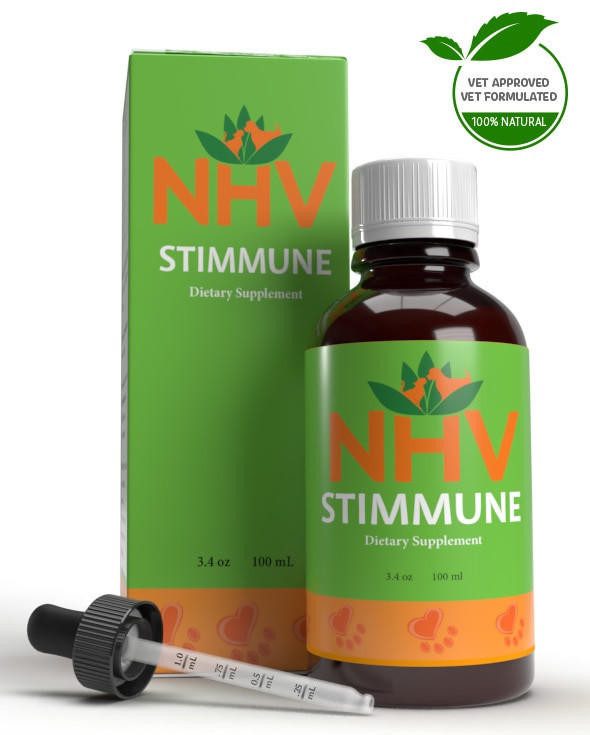
free shipping over $100 (USA & Canada)
1-877-937-4372 the pet expert hotline
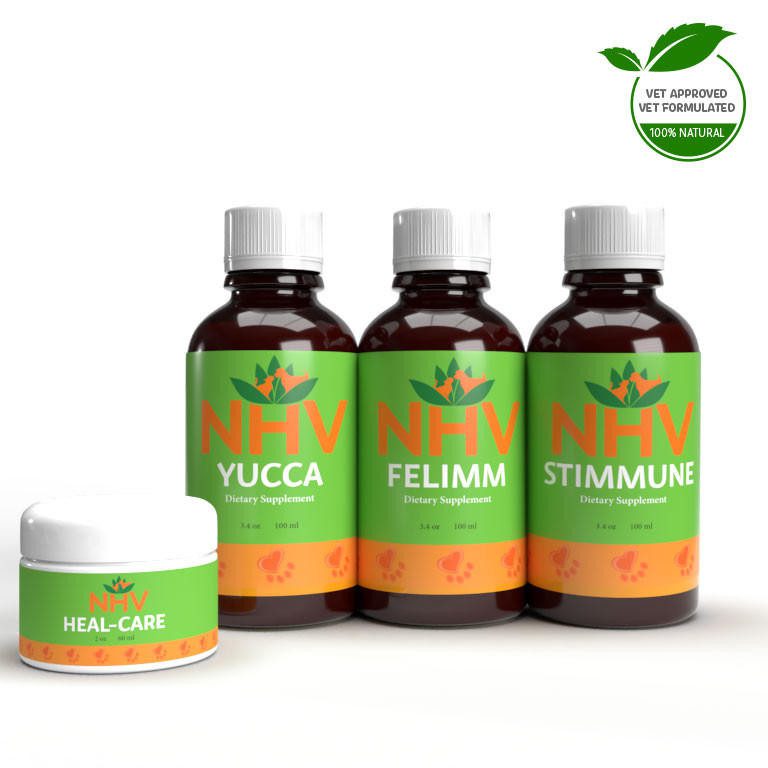
Felimm, Yucca, Stimmune & Heal Care Ointment

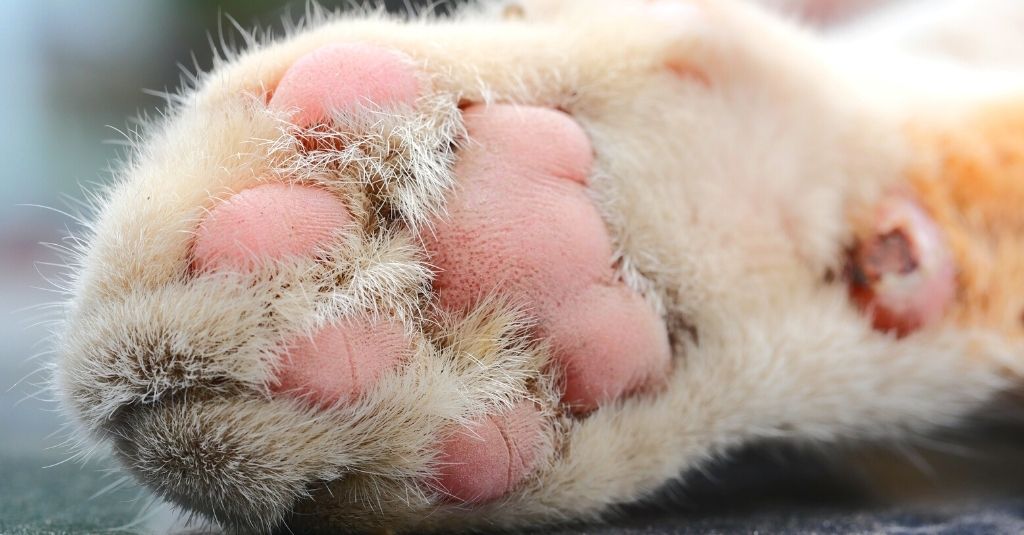
Pillow Foot in Cats (Plasma Cell Pododermatitis in Cats) is a rare disease of the footpads of cats. Due to the accumulation of a specific type of white blood cells called plasma cells, the footpad becomes inflamed. Plasma cells play a major role in the immune system.
The cause is unknown but is thought to be immune-mediated; that is, the immune system causes or aggravates inflammation. Some studies have found a link between pillow foot and feline immunodeficiency virus (FIV) infection so it is important to screen an affected cat for this virus.
In the early stages of pododermatitis, soft, non-uncomfortable swelling of the footpads develops.
In the early stages of pododermatitis, soft, non-uncomfortable swelling of the footpads develops. More than one pad on more than one foot is typically involved. Pads may look purple and appear streaky, with white scaly material on the surface. Later, the pads can become bloody and uncomfortable. Sometimes kidney disease and inflammation of the tissues in the mouth can also occur.
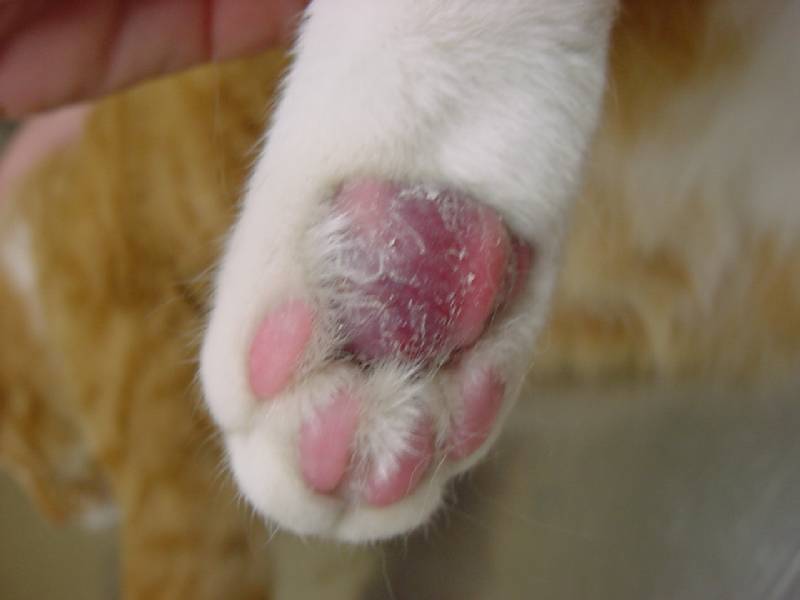
The main diagnostic marker is simply the appearance of the footpads. Removing cells with a small needle and examining them under the microscope (fine needle aspirate) may reveal numerous plasma cells. Blood tests may be recommended to look for infection, kidney problems, or evidence of immune response, but the results are variable. A biopsy of an affected foot pad usually confirms the diagnosis.
Treatment may be not needed if the inflammation is mild and the cat feels okay. In some cats, the condition spontaneously disappears. However, in other cats, medications are needed to balance the immune system. In this case, steroids or immune-suppressive medications may be prescribed. Sometimes, surgery is an option to remove lesions that affect only one food pad, but this is uncommon. Many pets require some medication for life and need periodic blood tests to monitor for adverse effects of the medications.
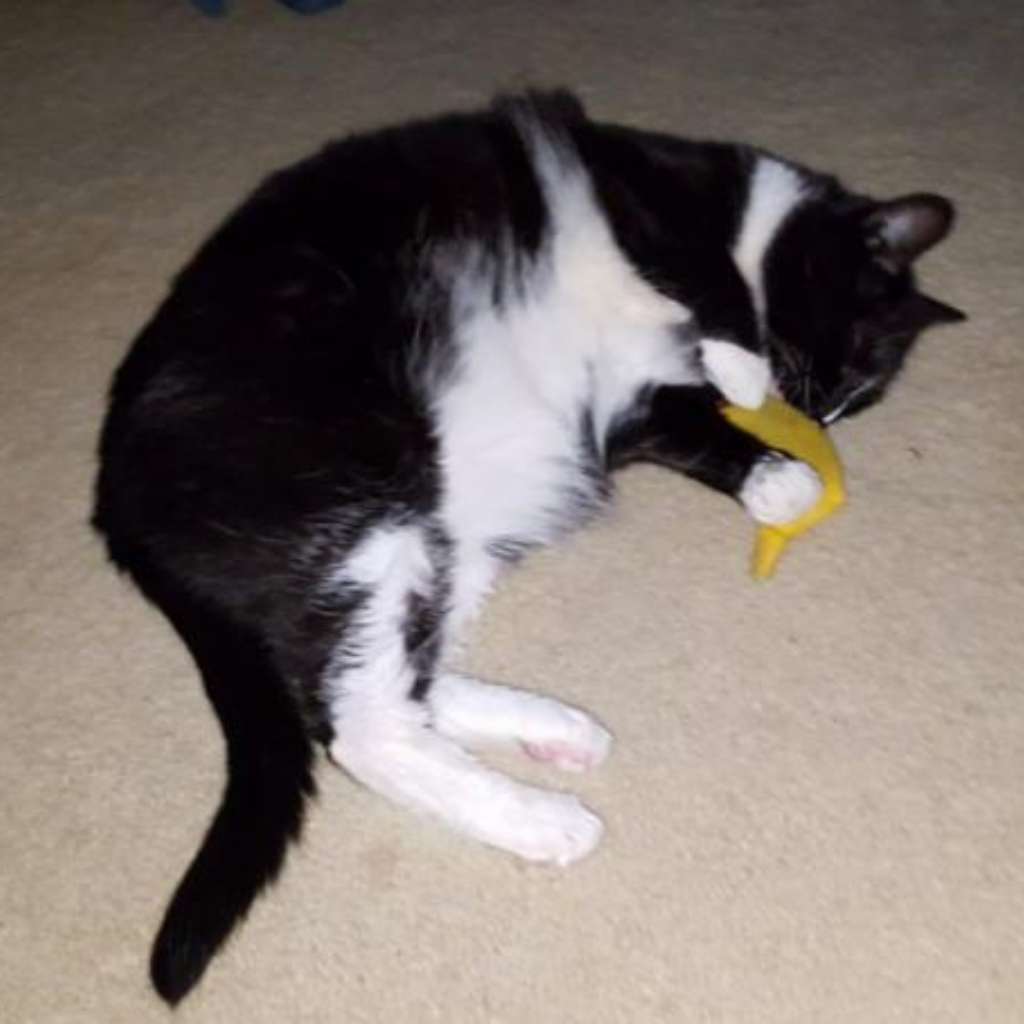
Prognosis can be good if the signs spontaneously resolve. Prognosis may only be fair, however, if long-term immune-suppressive drugs are needed or if the kidney and mouth are involved.
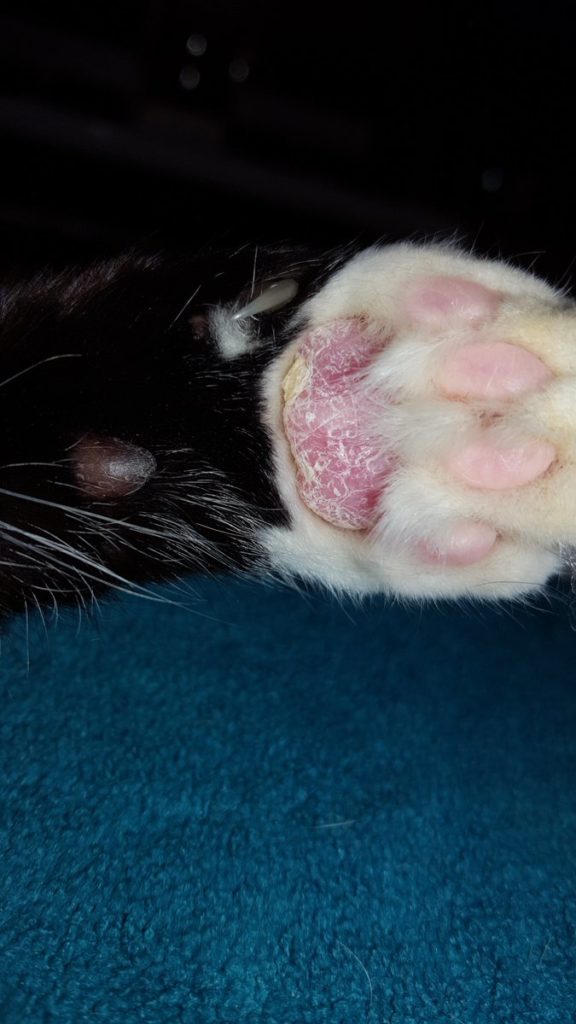
There are many supplements that NHV has to support a cat with pillow foot or pododermatitis. The two most useful ones according to me are:
Felimm: as some studies have shown, pillow foot may have a relationship with FIV, the herbs present in this formulation can be helpful to balance the immune system, help fight against FIV and pillow foot. NHV Felimm is great to help support the lymphatic system.
Yucca: Yucca contains steroidal saponins that are well researched and reported and stimulate the body to produce its own natural corticosteroids. This can help to modulate the immune system and ease inflammation. NHV Yucca is formulated and dosed specifically to be safe for long-term use in pets.
However, based on the cat’s specific symptoms the NHV Pet Experts would recommend a holistic regimen. For little Herbie Johnson, NHV Stimmune proved to be really helpful. If the cat’s paws are cracking due to the inflammation then NHV Heal Care ointment will be useful for promoting healing, topically.
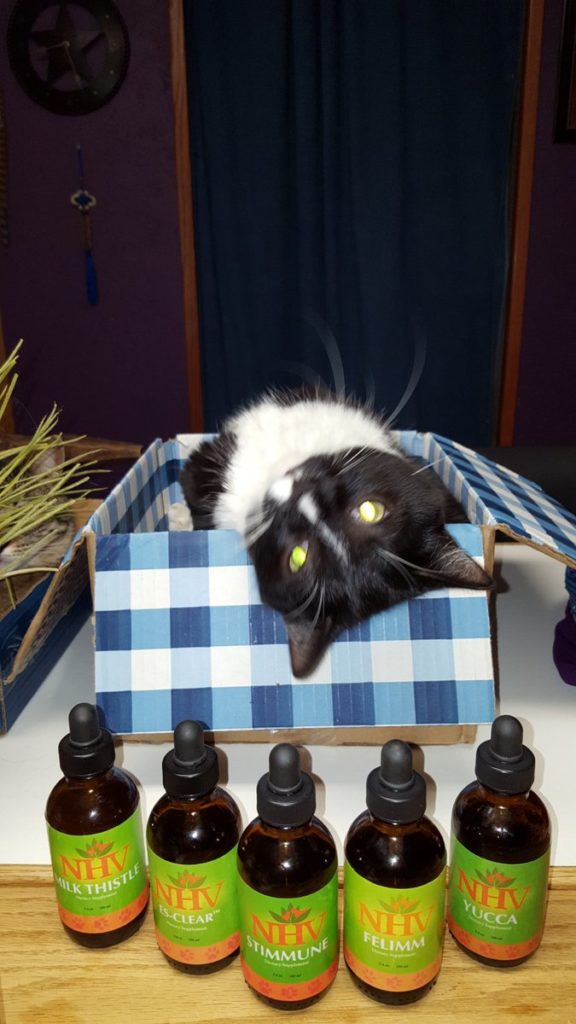
You can book a consult with Dr. Amanda here or get a customized diet plan , specially formulated for your pet.
immune & allergy support

Holistic Remedy for Food Allergies and Immune Support in Cats
buy 2 and save $3
3 month supply for a small to medium size
Helps your cat overcome food allergies, skin allergies, and fight infection.

Helps your cat overcome food allergies, skin allergies, and fight infection.
Cats can be allergic to the things they eat and touch, just like people can. With NHV’s Stimmune, your kitty will get potent immune supporting herbs that help support your cat with food allergy reactions, as well as reactions related to fleas, dermatitis, insect bites, diet, and exposure to chemicals and drugs. For seasonal or environmental allergies, please try Alge-Ex for a remedy specifically formulated for your cat.
At NHV, all of our pet products are formulated by a master herbalist as well as a holistic veterinarian having more than 20 years of experience. Some ingredients are even wild-crafted which means they were ethically harvested from their natural environment. Our products are also safe for long-term use and are supplements that animals like to take, including finicky kitties.
If you have questions about holistic remedies for cat allergies to food or any of our wide variety of products, you can ask an NHV expert. Our very supportive professional team of pet experts are here to help and recommend supplements because, at NHV, we want your kitty feeling pawtastic naturally!
Stimmune Is Also Helpful for:
Cats can get food allergies from their diet, and other allergies from their environment when allergens are inhaled, ingested, or absorbed by the body. Once this happens, the immune system overreacts, and this is when your kitty will need extra balance and support.
Read about a senior cat’s Helenda’s transformation using Stimmune.
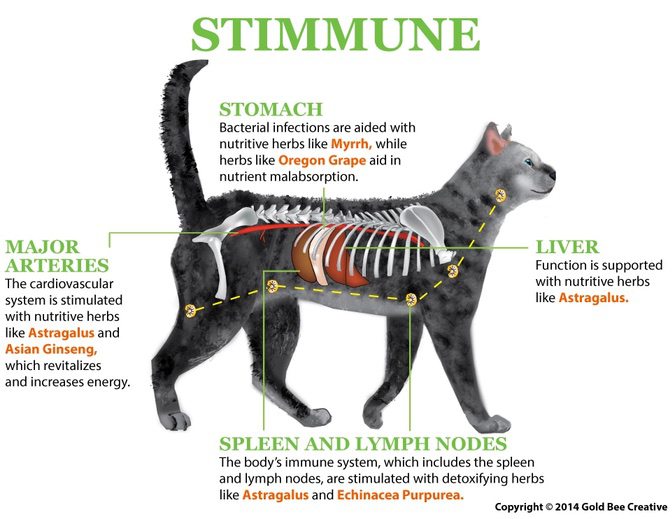
How NHV’s Stimmune Helps Allergies in Cats
Stimmune promotes healthy immune activity and histamine response with five natural herbs formulated to reduce environmental allergies in cats.
Stimmune provides support in addition to conventional treatment for all forms of allergies including pollen allergies in cats.
Select your pet's weight to determine the correct dose.
Cats can be allergic to the things they eat and touch, just like people can. With NHV’s Stimmune, your kitty will get potent immune supporting herbs that help support your cat with food allergy reactions, as well as reactions related to fleas, dermatitis, insect bites, diet, and exposure to chemicals and drugs. For seasonal or environmental allergies, please try Alge-Ex for a remedy specifically formulated for your cat.
At NHV, all of our pet products are formulated by a master herbalist as well as a holistic veterinarian having more than 20 years of experience. Some ingredients are even wild-crafted which means they were ethically harvested from their natural environment. Our products are also safe for long-term use and are supplements that animals like to take, including finicky kitties.
If you have questions about holistic remedies for cat allergies to food or any of our wide variety of products, you can ask an NHV expert. Our very supportive professional team of pet experts are here to help and recommend supplements because, at NHV, we want your kitty feeling pawtastic naturally!
Stimmune Is Also Helpful for:
Cats can get food allergies from their diet, and other allergies from their environment when allergens are inhaled, ingested, or absorbed by the body. Once this happens, the immune system overreacts, and this is when your kitty will need extra balance and support.
Read about a senior cat’s Helenda’s transformation using Stimmune.

How NHV’s Stimmune Helps Allergies in Cats
Stimmune promotes healthy immune activity and histamine response with five natural herbs formulated to reduce environmental allergies in cats.
Stimmune provides support in addition to conventional treatment for all forms of allergies including pollen allergies in cats.
Select your pet's weight to determine the correct dose.
skin support
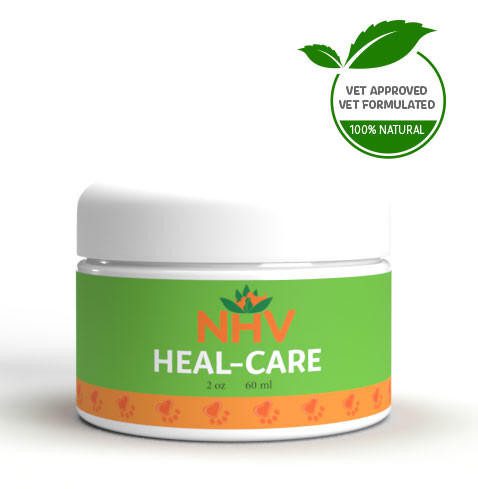
All-Natural Cat Paw Pad & Injury Relief Ointment
buy 2 and save $3
Cats love adventure. Whether it’s climbing trees or jumping onto counters, their paws play an important role in their busy schedule. Paw pad injuries, cuts, bruises, sprains, and infection can all throw off your cat’s day and make their usual play uncomfortable or even uncomfortable. Protect playtime and keep those toe beans healthy, with NHV Heal Care ointment for paw pads:

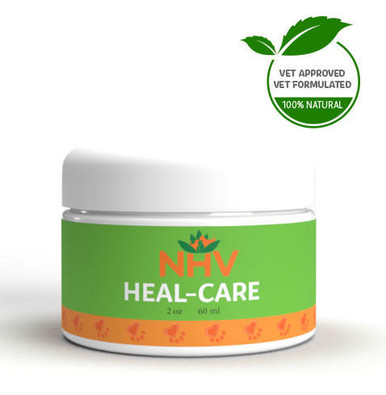
Cats love adventure. Whether it’s climbing trees or jumping onto counters, their paws play an important role in their busy schedule. Paw pad injuries, cuts, bruises, sprains, and infection can all throw off your cat’s day and make their usual play uncomfortable or even uncomfortable. Protect playtime and keep those toe beans healthy, with NHV Heal Care ointment for paw pads:

An Effective Ointment for Cat Injuries and Wounds
A natural topical ointment made with arnica and St. John’s wort in an Olive oil and bee’s wax base, NHV Heal Care can help rescue your kitty’s hurt or injured paws. This herbal ointment for cats helps soothe inflammation, and supports healing, and is completely safe if licked by your little one (though we always recommend wrapping in gauze if possible).
NHV Heal Care is useful for:
Support for Pillowfoot in Pets
Pododermatitis or Pillowfoot is when your cat’s foot pads swell. You may notice symptoms like swelling, softness, ulceration, and discharge. Heal Care along with the supplements found in our Pillowfoot kit help provide full spectrum support for your little one.
*Because swollen paws usually indicate an uncomfortable infection, contact your cat’s vet team immediately for treatment. X-rays may be necessary if your vet suspects a broken bone. Individual treatment for swollen paws varies depending on the cause. It may require constant nail trimming, a wound cleanse with antibiotics or a splint.
How NHV Remedies Support Cats With Sore Paws
The natural discomfort-relief properties of Arnica and St. John’s Wort can help keep them a little more comfortable. Arnica also works to balance your cat’s immune system, so when injuries do occur, this cat ointment for wounds can help add an extra layer of defense. Heal Care cat injury ointment aids the recovery process when bacterial or fungal infections do set in. The antifungal and antibacterial properties help clear up the infections causing your pet trouble.
Supplement Your Pet’s Prescribed Care Plan Today
Help to get your cats back on their feet with a 100% natural pet care solution that’s safe for everyday use. Heal Care Ointment for Cats can enhance your veterinarian’s current treatment plan for faster healing and a happier pet. Our cat ointment for wounds is vet-approved to ensure your pet is always receiving the best when it comes to pet support.
How to Administer
Topical ointment: Clean and dry paw pads. Apply to affected area 3 to 4 times per day until healed. It may be necessary to use booties or wrap the paw with gauze dressing so that your pet does not lick the ointment.
Caution
Do not apply on open or bleeding wounds. Heal Care ointment contains arnica which may cause a skin allergy on some very sensitive pets. Try the product on a hairless part of the body first to test for sensitivity
An Effective Ointment for Cat Injuries and Wounds
A natural topical ointment made with arnica and St. John’s wort in an Olive oil and bee’s wax base, NHV Heal Care can help rescue your kitty’s hurt or injured paws. This herbal ointment for cats helps soothe inflammation, and supports healing, and is completely safe if licked by your little one (though we always recommend wrapping in gauze if possible).
NHV Heal Care is useful for:
Support for Pillowfoot in Pets
Pododermatitis or Pillowfoot is when your cat’s foot pads swell. You may notice symptoms like swelling, softness, ulceration, and discharge. Heal Care along with the supplements found in our Pillowfoot kit help provide full spectrum support for your little one.
*Because swollen paws usually indicate an uncomfortable infection, contact your cat’s vet team immediately for treatment. X-rays may be necessary if your vet suspects a broken bone. Individual treatment for swollen paws varies depending on the cause. It may require constant nail trimming, a wound cleanse with antibiotics or a splint.
How NHV Remedies Support Cats With Sore Paws
The natural discomfort-relief properties of Arnica and St. John’s Wort can help keep them a little more comfortable. Arnica also works to balance your cat’s immune system, so when injuries do occur, this cat ointment for wounds can help add an extra layer of defense. Heal Care cat injury ointment aids the recovery process when bacterial or fungal infections do set in. The antifungal and antibacterial properties help clear up the infections causing your pet trouble.
Supplement Your Pet’s Prescribed Care Plan Today
Help to get your cats back on their feet with a 100% natural pet care solution that’s safe for everyday use. Heal Care Ointment for Cats can enhance your veterinarian’s current treatment plan for faster healing and a happier pet. Our cat ointment for wounds is vet-approved to ensure your pet is always receiving the best when it comes to pet support.
How to Administer
Topical ointment: Clean and dry paw pads. Apply to affected area 3 to 4 times per day until healed. It may be necessary to use booties or wrap the paw with gauze dressing so that your pet does not lick the ointment.
Caution
Do not apply on open or bleeding wounds. Heal Care ointment contains arnica which may cause a skin allergy on some very sensitive pets. Try the product on a hairless part of the body first to test for sensitivity
discomfort support

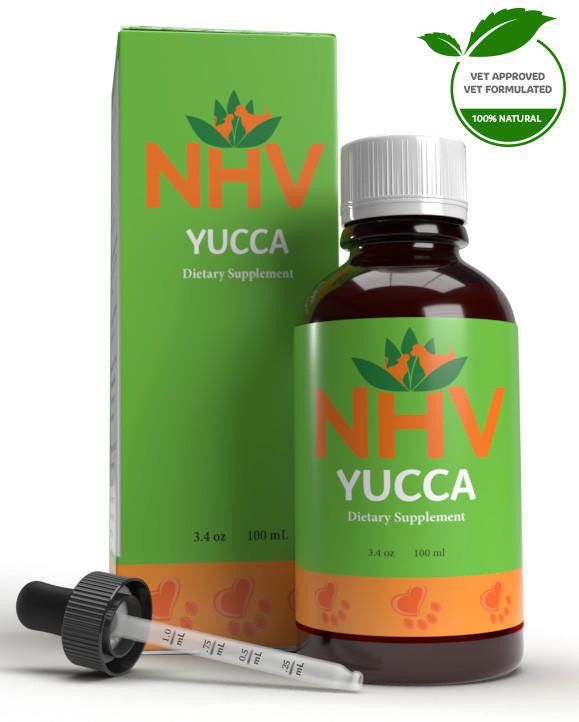
Support for Discomfort and Appetite Stimulant
buy 2 and save $3
3 month supply for a small to medium size
NHV Yucca is used for cats as a supplement to provide nutrients, and may be helpful for discomfort, inflammation, and to increase or balance the appetite.


NHV Yucca is used for cats as a supplement to provide nutrients, and may be helpful for discomfort, inflammation, and to increase or balance the appetite.

Yucca is used in cat food as well as food for other animals around the world. Its root is a highly nutritious herb that’s rich in vitamin C, beta-carotene, B vitamins, magnesium, iron, calcium, manganese, protein, niacin, and phosphorus.
Yucca contains two very beneficial compounds: sarsasapogenin and smilagenin. These two compounds work on the mucous membranes of the small intestine. These compounds help with the penetration and absorption of minerals and vitamins. Sarsasapogenin and smilagenin are known as steroidal saponins (phytosterols) which act as precursors to corticosteroids produced naturally by the body.
Steroidal saponins support the immune function of the body while stimulating and supporting the production of its own corticosteroids and corticosteroid–related hormones. Due to this action, studies conducted on Yucca have shown that it may be beneficial and effective for discomfort relief and inflammation in conditions such as arthritis. Yucca for cats may also be a natural appetite stimulant and may also help reduce the production of urease, which contributes to the unpleasant odors of urine and feces in some cats.
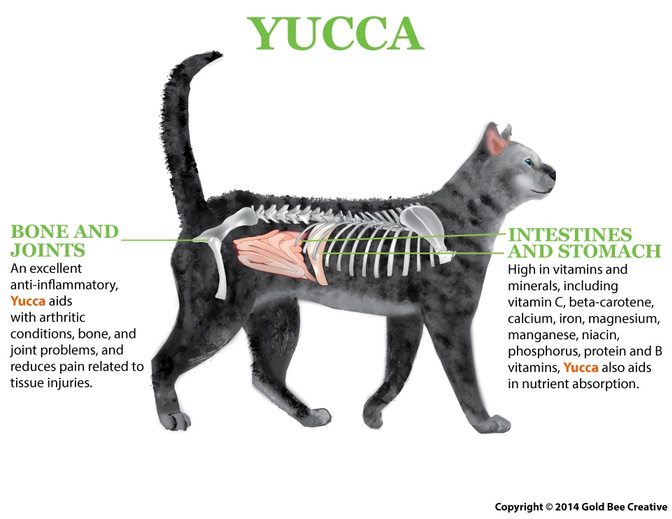
Yucca - Commonly used for supporting arthritis, as an anti-inflammatory, nutritive, antitumor, and digestive supplement.
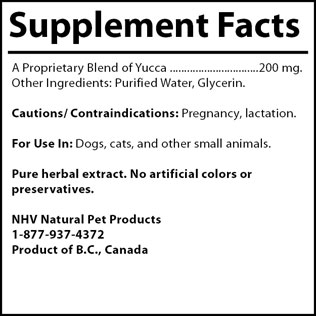
Select your pet's weight to determine the correct dose.
To be taken twice daily. Determine your pet’s weight and then use the easy chart below to determine the correct dose. This is the minimum dosage.
Pet's Weight Dosage
0 - 15 lb = 0.5 ml
16 - 30 lb = 1.0 ml
31 - 45 lb = 1.5 ml
46 - 60 lb = 2.0 ml
61 - 75 lb = 2.5 ml
Over 75 lb = 3.0 ml
How to Administer: Shake well before use. The easiest method is to use the dropper provided and place the drops into your pet’s food or favorite treat. You can also use the dropper and squirt directly into the pet’s mouth. Some pets can be finicky, if this occurs consider hiding the drops in foods most pet’s love such as fish, chicken, yogurt, or a favorite treat. If your pet only eats dry food then soak a few kibbles at feeding time.
For Best Results: Herbal dietary supplements are beneficial to the health and well-being of your pet and are safe for long-term use. Every pet responds to natural herbal supplements differently, therefore it is important to be consistent and administer the product daily. Supplements generally take two to four weeks to take effect, however this will vary from one animal to the next.
Product Storage:
All NHV Natural Pet Products are pure herbal extracts and contain no artificial additives, preservatives or coloring. Shelf life after opening is 6 months and must be refrigerated after opening.
Cautions and Contraindications
Do not use Yucca in pregnant or nursing animals.
Speak to your vet before using our products. A second visit is recommended if your pet’s condition does not improve, or deteriorates after continued use of the supplements. All information provided by NHV Natural Pet Products is for educational purposes only.
Yucca is used in cat food as well as food for other animals around the world. Its root is a highly nutritious herb that’s rich in vitamin C, beta-carotene, B vitamins, magnesium, iron, calcium, manganese, protein, niacin, and phosphorus.
Yucca contains two very beneficial compounds: sarsasapogenin and smilagenin. These two compounds work on the mucous membranes of the small intestine. These compounds help with the penetration and absorption of minerals and vitamins. Sarsasapogenin and smilagenin are known as steroidal saponins (phytosterols) which act as precursors to corticosteroids produced naturally by the body.
Steroidal saponins support the immune function of the body while stimulating and supporting the production of its own corticosteroids and corticosteroid–related hormones. Due to this action, studies conducted on Yucca have shown that it may be beneficial and effective for discomfort relief and inflammation in conditions such as arthritis. Yucca for cats may also be a natural appetite stimulant and may also help reduce the production of urease, which contributes to the unpleasant odors of urine and feces in some cats.

Yucca - Commonly used for supporting arthritis, as an anti-inflammatory, nutritive, antitumor, and digestive supplement.

Select your pet's weight to determine the correct dose.
To be taken twice daily. Determine your pet’s weight and then use the easy chart below to determine the correct dose. This is the minimum dosage.
Pet's Weight Dosage
0 - 15 lb = 0.5 ml
16 - 30 lb = 1.0 ml
31 - 45 lb = 1.5 ml
46 - 60 lb = 2.0 ml
61 - 75 lb = 2.5 ml
Over 75 lb = 3.0 ml
How to Administer: Shake well before use. The easiest method is to use the dropper provided and place the drops into your pet’s food or favorite treat. You can also use the dropper and squirt directly into the pet’s mouth. Some pets can be finicky, if this occurs consider hiding the drops in foods most pet’s love such as fish, chicken, yogurt, or a favorite treat. If your pet only eats dry food then soak a few kibbles at feeding time.
For Best Results: Herbal dietary supplements are beneficial to the health and well-being of your pet and are safe for long-term use. Every pet responds to natural herbal supplements differently, therefore it is important to be consistent and administer the product daily. Supplements generally take two to four weeks to take effect, however this will vary from one animal to the next.
Product Storage:
All NHV Natural Pet Products are pure herbal extracts and contain no artificial additives, preservatives or coloring. Shelf life after opening is 6 months and must be refrigerated after opening.
Cautions and Contraindications
Do not use Yucca in pregnant or nursing animals.
Speak to your vet before using our products. A second visit is recommended if your pet’s condition does not improve, or deteriorates after continued use of the supplements. All information provided by NHV Natural Pet Products is for educational purposes only.
Published: September 20, 2019
5 replies
Hi, As a cat lover & had a lot of cats in my life & still have quite a few at home, I was very interested to read about Paw pillow & found it very beneficial for me to understand this. It was very easy to understand & learn. Thankyou very much as I haven’t come across this , but will be well prepared. Yours truly Susan Barkle
Hi Susan,
Thank you so much for reaching out to us!
As fellow cat lovers, we love knowing that you found our blog on pillow foot beneficial! It’s important as pet parents to be able to look out for symptoms and signs that our furkids may need some help. Please know that we’re always here if you have any questions or just want to chat, and we have lots and lots of informational blogs that we’d be more than happy to share with you as well!
Sending you lots of love and positivity!
Yours in wellness,
Team NHV
I tamed a black stray kitty that had soft paw, although at the time I didn’t know anything about that. I just knew he was bleeding all over my porch and didn’t leave the shade of my truck although the temp was 95. I knew that was not normal. Put together that he was out of the same litter with my stray mother and his sister and brother. They are all normal, but he had the paw problem diagnosed, when we took him to have him fixed. I kept him inside a cat kennel I built inside my garage when I observed he couldn’t get along with his brother and sister. Too much street fighting in his past. But he made a decision to stay close because he had food and water and loved his attention. Unfortunately. He developed a stomach problem as well throwing up two to three times a week. So his I paws swelled until they burst open and were raw. Thought he might develop a infection with the kitty litter box, but never did. A very loving kitty. I didn’t realize his paws and stomach problem were connected to some sort of autoimmune disease. I always thought he’d consumed antifreeze which damaged his liver. The kitty was perfectly happy and contented but couldn’t overcome his problems. Turned out the soft paw was the least of his problems. My vet recommended we put him down. I still feel guilty, I loved midnight, and know I gave him the best life he’d had . It was a tough decision. But he couldn’t get better only worse. He isn’t suffering any more.
Hi Steve,
Thank you so much for sharing your beautiful story with us on our blog, about Midnight. It sounds like your boy had been through a lot and you were always there for him. Thank you so much for giving him all your love and support.
We are absolutely positive that Midnight loved and appreciated you wholeheartedly. Please continue to cherish all the beautiful memories you’ve made together.
Please know that our whole team is here for you if you ever need us. We’re always happy to help.
Sending you lots of love.
Hi Amanda,
Thank you so much for reaching out to us.
We’re so sorry to hear that your precious boy is going through this. We can’t imagine how stressful and uncomfortable this must be. Please know that our team is always here for you.
Our supplements are 100% all-natural, powerful, and gentle, so none of our formulas will harm your little one. Our recommendation for pillow foot in cats would be our Pododermatitis Super Support Kit, which contains our Felimm, Yucca, Stimmune & Heal Care Ointment. When used together, they can help to promote healing of the paws, soothes discomfort, and reduce inflammation.
In addition, we think including Milk Thistle in your kitties regimen may help as well since he’s been taking traditional medications that can be tough on the body, especially the liver and kidneys. Milk Thistle can help to promote liver and kidney health, and can encourage liver regeneration.
For more on Milk Thistle, click here: https://www.nhvnaturalpetproducts.com/milk-thistle-for-cats/
We hope this information helps, sending all our love and well wishes your way.
Yours in wellness,
Team NHV